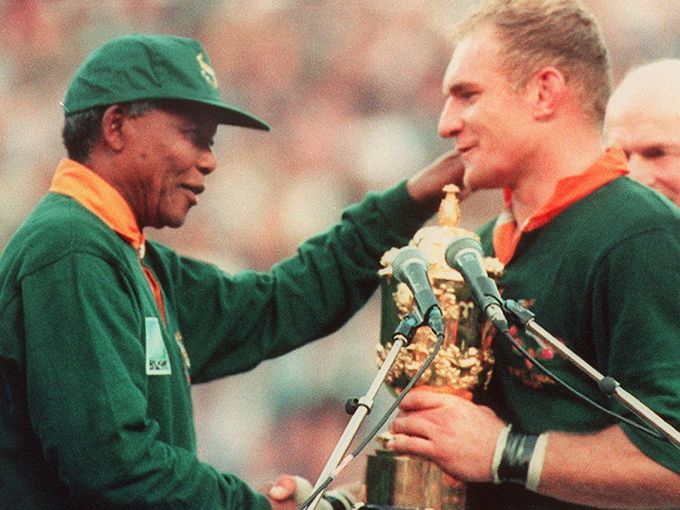Nelson Mandela, 1918-2013: Healing Through Sports
A man who helped change, and heal his country by utilizing sports.
Nelson Mandela, left, greeting and congratulating South African rugby player, Francois Pienaar, who won the Gold Cup for South Africa in the Rugby World Cup.
Nelson Mandela, a famed politician and philanthropist who led South Africa out of the dark days of apartheid, has died at the age of 95. Apartheid was an official policy of racial segregation formerly practiced in the Republic of South Africa, involving political, legal, and economic discrimination against nonwhites. Mandela rose from poverty and obscurity, defeated the white minority rule in South Africa and became the president of the country in 1994.
Mandela was taken as a prisoner in 1962 for “high treason” against his country because of his beliefs and ideas that he thought would make his country better. Twenty-seven years later Mandela was released from prison, became a politician, and developed a plan to lead his country out of apartheid.
Perhaps the biggest factor that helped Mandela lead his country out of the harsh racial tension was through none other than the realm of sports. Mandela, who was a avid boxer in his youth, grew up in an English school tradition which assumed that sports teaches values, builds character, shows you how to work hard and play together.
Sport was a part of his life even during his time as a political prisoner. He helped organize a limited sports program in the isolation section at his prison where he, and other isolation prisoners became fans of the prison soccer teams. “Soccer is more than a game. It can create hope where there was once despair; the game made us feel alive,” said Mandela years later.
Mandela worked hard to get South Africa involved in international sports. He volleyed to get South Africa to host the Rugby World Cup in 1995, followed by the 1996 African Cup of Nations in soccer, and the 2003 Cricket World Cup. The ultimate triumphant moment for him was in 2010 when FIFA brought the crown jewel of international sports, the (Federation International Football Association) FIFA World Cup, to South Africa. Even when Mandela’s health was declining, he lobbied hard for the bid, because he knew how much soccer meant to the vast majority of South Africans. The 2010 World Cup was a prime example of using sports to bring together a nation.
South Africa did not win the 2010 Cup, however victory was not decided by a trophy, rather it was decided by a country’s willingness to come together and show the world that South Africa was completely able of showing itself positively on the world stage. Of course, led by their leader, Mr. Nelson Mandela, who had a deep passion for his country, and for team sports, and knew how much they mattered to his people.










